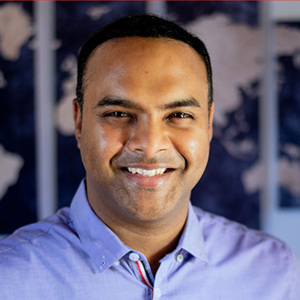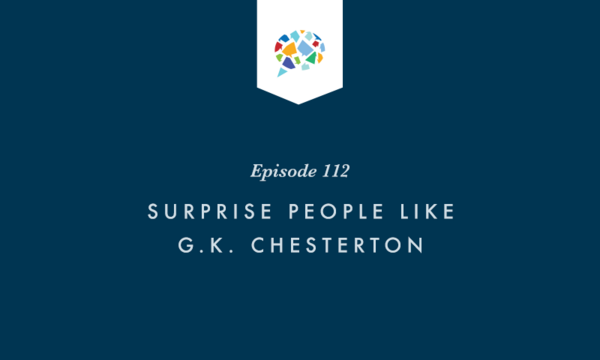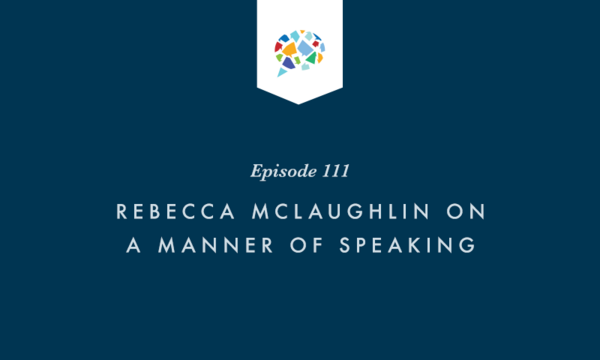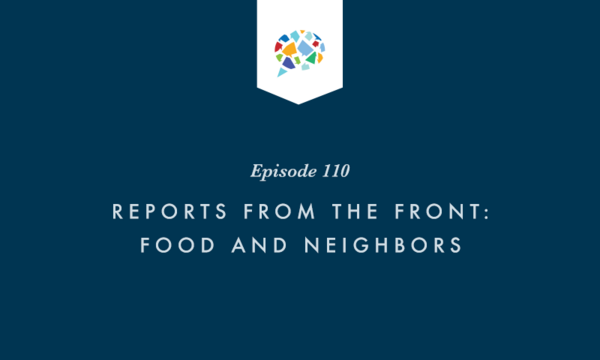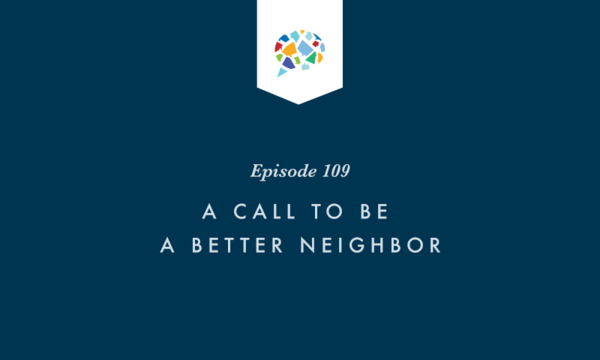
Prashan De Visser returns to the podcast to speak with Tim and Rick on trends and themes in America that undermine peacemaking efforts. Drawing from his experience with Global Unites, Prashan underscores the importance of working with the young generation and how the older generation can help the younger generation. They also discuss theological underpinnings for peacemaking as well as practical ways to engage in peacemaking efforts. You can listen to the previous conversation with Prashan on Episode 61: Building Bridges People Will Cross (January 9, 2023).
Transcript
Rick Langer: Welcome to the Winsome Conviction Podcast. My name's Rick Langer and I'm a professor at Biola University, and also the co-director of the Winsome Conviction Project with my friend Tim Muehlhoff.
Tim Muehlhoff: Hi, it's great to be back, Rick. Rick, we have a returning guest.
Rick Langer: That's wonderful.
Tim Muehlhoff: They usually run, our guests, once they're on the show. But we have a returning guest. Prashan De Visser was so intriguing, of talking about how he's trying to take Sri Lanka, and actually get to the young generation.
Rick Langer: And make a difference.
Tim Muehlhoff: And make a difference.
Rick Langer: And make the young generation a new generation. And it was just fascinating.
Tim Muehlhoff: It was fascinating, 1.5 million people going through their program, and we encourage you to go back to listen to that one. But then we thought it might be really nice to have him talk specifically to the American context, but let me give you a quick introduction. Prashan is founder of Global Unites, an organization that aims to inspire, connect, and equip youth to transform global societies through movements promoting nonviolence and reconciliation. He's a 2015 graduate of the Kroc Institute's Master in International Peace Studies program. He's been featured on NBC, BBC for his innovative peace building approach. And I thought this was interesting, Rick. Recently he received the Points of Light award from the Queen of England for his exemplary volunteer service to his nation.
We check our email daily to see what we're getting, and so far we've not gotten anything. But we do have for Prashan back for a second thing. Hey, can we just for a second talk about that? What an honor to receive that award. What was your reaction to receiving that?
Rick Langer: Yeah, tell us about it.
Tim Muehlhoff: We want to live vicariously through you.
Rick Langer: Yeah, right.
Prashan De Visser: We've been working in Sri Lanka for 15 years, and then Afghanistan, Congo, all these other 13 countries for another seven years. We're never doing it with looking for opportunities to get recognized, we didn't even know people were watching. But we received a call from the British High Commission in Sri Lanka and said, "We were honored to announce to you that we received this." And it's done amazing, because that kind of creates more credibility for us to continue the work, to go to even the governments, and donor organizations, and others, and saying, "What we do has been monitored, and vetted, and celebrated by these..." And we were touched when they gave us the narrative of why they were recognizing us, to understand this level of impact, and this is how it's done. And we appreciate that and want to encourage that, that was definitely an added inspiration to keep going beyond our own conviction of we are going to do this. That we feel called by God to do this work.
Tim Muehlhoff: Yeah, that's great. We were debating whether to have you on again, and to be honest, it was the Point of Light award that tipped it over to let's...
Rick Langer: All right, back to reality.
Tim Muehlhoff: Okay, back to reality. No, we're so thrilled you'd join us again.
Prashan De Visser: Oh, thank you for having me.
Rick Langer: So Preshan, one of the things we'd love to have you do, is talk a little bit about how you see things in the American context, because obviously most of our listeners probably come from that. And I think as you have been educated here, you have an ongoing and very deep knowledge of our country, in addition to all the things you've done in other places. And one of the things that often happens, you mentioned this even within Sri Lanka, is people kind of get in their ruts and ways of thinking, and it's really helpful to suddenly confront someone from the opposite ethnic group, the north part of the island, south part of the island. The same thing happens when you cross the country, so we would love to have you talk to us a little bit about how you see things unfolding in the United States. And maybe some insights, some things that would be valuable for us to hear.
Prashan De Visser: Well, thank you once again for having me, and the opportunity to share on this. I'll go back to four points here. As an outsider looking to the states, I love your country, this is my second home. If I wasn't called to live and serve in Sri Lanka, I'll be here in a heartbeat, and I will do anything to serve. And one thing I've seen is, first of all on a theological understanding of the importance of us being peace builders, making peace in our societies, seems to be lacking. In the Sermon on the Mount, Jesus says in Matthew 5:9, "Blessed are the peacemakers, for they shall be called the children of God." And that's a pretty intense note, children of God, peacemakers. He said a whole bunch of things about righteousness, about those who are persecuted, those who are in poverty and all that, but he separated children of God for peacemakers.
Now, all my life I thought I accepted Christ and I am a child of God, but now this says peacemakers and children of God. So do I need to be a peacemaker in order to solidify the fact that I am a child of God? Or do children of God by default engage in peacemaking? Regardless, it makes it very clear that peacemaking is not a Christian elective. It is core to who we are, and it's something we need to be doing. And I see that lacking in our teaching in the church, in society, in the US, that that needs to be [inaudible 00:05:14].
And it's not just an isolated statement Jesus said, in his final prayer before the cross as he was praying for us, the disciples who will come to know the Lord because of the disciples work, he says, "Lord, may they be one." In John Chapter 17, "So that the world will know that I am your son. Just as you and I are one, so that the world will know that I am the Messiah." And the litmus test for the world to know if Jesus is Lord was the unity in our society, in our communities, in our church.
He put a lot on that. And so the bull's eyes are blinded to the truth of who Christ is, and to the gospel, because Satan hit us just there, to divide us as much as he can, to create hatred, to create prejudice, to create a desire to no longer engage, to move away. And the more we do that, the more the eyes get blinded. And as an outsider of the states, and I'm going and speaking in churches here, I say, "I believe millions will come to know Jesus as the son of God, as the Messiah. They'll come to hear the good news, if in the US the church can lead the way for true healing and reconciliation and come together."
Tim Muehlhoff: Well, we're done, podcast over. We are absolutely done. But in a way I am totally not kidding, in the fact that we can't gloss over that point. I mean, the weight that Jesus placed on that demands a response from us, particularly the American church. Rick and I, we did all of our education at secular universities. If you went to those universities and said, "Hey, we're just going to do a quick survey, what word comes to mind when we say evangelical or conservative Christians?" Rick, do you think peacemakers would show up in one of the top five, six words that they would use for Christians? I mean, I think we're tragically a long way of people associating us with peacemaking.
Rick Langer: Well, no, I don't think it would. I think far more tragic is if we were to go to five evangelical churches and ask members of the church how they experience their own church life, how often would peace and unity come up? So I've been part of evangelical churches for several years, 45 or something. And I feel like in the last seven or eight years, the increase... There's always been conflict and things like that, that's just part of life, it's part of New Testament life.
But in the last seven or eight years, there's been a special vitriol and disdain for people on the opposite side of controversies within church. And it's easy to say it's just political, but as I look at it I say it's creeped out of the politics, you begin to get addicted to the conflict and suddenly you find us now fighting our internal battles about, do we build a building or not build a building? Or what do we do with the [inaudible 00:08:27] or whatever? The same acrimony seems to travel with it. So I'm really profoundly concerned about this. But back to you, Prashan, about some of these things.
Prashan De Visser: Yeah. So for us theologically, this once again is not an elective, and Jesus was very clear about it. There are many things that in the Bible we're trying to figure out, what's the priority on this? Where does this fall? There is no debate on it, but for some reason it's fallen off the table, maybe because we've run away far from it that now even putting it back on the table exposes how far away we've been. And I think that needs to be a clear call to the church right now. So that's the logical number one. But number two, is you start looking at your country's context. The polarization is not just... People always say... But let's look at the numbers here. Pew Research did a study when they looked at elections and the 10 values that the Republicans and Democrats had from elections in the mid-nineties and all the way up to 2016, the common ground that Republicans, and Democrats, and people from different backgrounds had has been widening over the years.
And the study clearly shows when it comes to 2016, it's a chasm. But this was before the elections following that. And I haven't seen a study of that recently, but if you look it's scary. And for us who work in countries with civil conflict and violence, when those numbers hit that level, that's danger signs for us. Because what happens is... They did the study and they asked the question, "Do you know anybody who voted for President Obama for a second time?" And most people are saying no. And, "Do you know anybody who voted for President Bush for a second time?" They said no. What it shows is that they're segregated so much, they don't even know anybody who voted that way, that's dangerous, because then what happens is it's easy to dehumanize the other. And in fact, over 40% of Republicans saw Democrats as a threat to the nation's wellbeing. And the same amount of Democrats saw the Republicans as a threat to the nation's wellbeing, both ways.
Now, until 9/11, when you used the word threat in your country that was terrorism, or violence against it. But now you see a threat to the nation's wellbeing, that's dangerous territory. That means you could have a few extremists within that community who say, "All right, there's a threat, and I'm going to neutralize that threat. I'm going to take matters to my own hands."
Civil wars don't start because millions of people decide to take up arms, a few people decide to be seen, elevated in their own community, and saying, "I did something about it. Cheer me on." And sometimes even before they do it, they start talking about it. And as they're talking about it, you have a lot in their community who won't challenge them and say, "Shut up. You can't talk like that, that's wrong." They'll just empathize with them, or they will try to kind of... "He's saying things that I don't want to say." And you just let that go. But when you allow that to happen, that's when things go crazy. We've seen that in our countries, our children have suffered in our countries. And the church, not only because it's our core of what we're supposed to be doing, but because of the crisis that's looming has to do more to bridge.
Tim Muehlhoff: And that's not a new observation. I mean, it's really insightful. We do have some American voices trying to make that exact same point, that the tone of our rhetoric is opening the door to actual physical violence. And so what a great perspective. And we have few voices that are trying to make the point as well, it just doesn't gain traction.
Prashan De Visser: And one of the reasons it doesn't, is people don't know what's the first step, how do I even respond to this? And secondly, they're not convinced that they need to respond to it. They're like, "Eventually that group will disappear." Or, "Well, we'll need to dominate and get rid of them, and we'll do what we can." And assuming you can solve problems that way, there'll be many countries who've tried that, and it just doesn't work that way.
But at the same time, I teach a class on the theory and practice of peace building at Crozer Colgate Seminary every year with PhD students. And these are people who really are passionate about peace building, coming from different racial communities, different backgrounds. And I do this exercise where I ask them to write 10 people that they would invite to their son's or daughter's wedding, so your inner circle. And they write it down, and then I say, "Would you please highlight anybody who's from a different race to you? Would you highlight anybody who's from a different political leaning to you, a different socioeconomic class to you?"
I've been teaching the class for about eight years, and the intersection has been less than 1%. But these are people who want to be peace building, who are amazingly gifted people. But the problem is because we don't have that core interaction, we don't have that ability to have that empathy, and then as a result have the compassion to now respond to correcting things in our society, and building those crucial bridges right now. The church needs to do better. Still 11:00 AM on Sunday, that's [inaudible 00:13:34], the segregated nature in this church... That's not what the church is supposed to look like, especially in a beautiful, glorious country like this. Why is the church still segregated? And yes, we can have different styles of worship, but given what's happening in the country, shouldn't the church be leading the way? Shouldn't we be a prophetic voice?
Because everybody else in your country has tried to address this polarization. When you look at it, the media has tried to do what they can, but as a result they've contributed to make it even worse. Arts and entertainment have tried to depict stories and tried to educate people, and all that have, has their bought reconciliation? Not yet, it hasn't. And then you look at the academia, they've been analyzing the problem over and over again, no solutions yet. And you look at people who are activists, sometimes they end up contributing to a further chasm. Politicians, it's not in their interest to fix this problem. Like I mentioned on our previous podcast, having a base of people who don't question, and have lost their ability to critically think and just be loyal to you is a politicians dream. So politicians don't want to fix this, on either side of the divide.
So then it falls to the church, will we respond? And that's huge, not only because it's our theological understanding of our role, but given the crisis, this is what we need to do. And thirdly, because there's no one else doing it, we have to do it, we have to lead, we have to serve right now. Get over your side, saying, "I'm going to hold on to this." And start saying, "Lord, how do I serve right now? What are you calling me to do? How do I build those bridges? How do I create that empathy?" So I think that's very important at the moment.
Tim Muehlhoff: The late, great Dallas Willard had an acronym VIM, vision intention means. And what I'm hearing you say, we need to reclaim the vision before we even get to the means, which is, okay, how do I practically do this? How do I practically serve as a peacemaker in Sri Lanka or the States? But what I'm hearing you say is we've lost the vision, the value of being a peacemaker, and that reflects us as being children of God. And what a great timely word to us.
Prashan De Visser: Yeah. One thing I'm also seeing is affluent societies that have become comfortable and look very glamorous, after a while their capacity, their threshold for pain diminishes, and their capacity to be uncomfortable diminishes. You work so hard for generations to get comfortable, and then I'll do everything I can to get more comfortable, whether it's physically, whether it's emotionally, whether it's intellectually, you want to get comfortable. But a society that's willing to become so comfortable sacrifices so much, that they would now try to sweep away stuff that's inconvenient, they don't want to deal with it. And for the church, this becomes the same, where can I be comfortable? Oh, this theology fits with me, this society fits with... I want that. This education institute, that fits with me, I just want that. What are you afraid of? Because if iron sharpens iron, go there, and if you believe what you have is true, go and engage.
Jesus did, he didn't stay comfortable. His most comfortable place would've been to just stick with the disciples. He goes to the synagogue, he goes to the poorest of the poor, he goes to the tax collectors house, he goes to places where [inaudible 00:16:55], but he goes and he engages because he knows he was walking with truth, and love, grace and truth. He went into those places. Why are we not going? If we truly believe that we're reflecting the light of Christ? He didn't call us to be the light of the church, he called us to be the light of the world. Then why are we still here? Go and engage in humility, not with the [inaudible 00:17:19], "I'm going to fix these people." No one wants to be fixed. But do life with people, engage, the churches need to. And if the church does that... I was talking to a pastor from Ferguson, we were having these conversations. He's from an African American community. And he said, "Prashan, I believe if the church does not play a prophetic role, we'll end up become a pathetic church."
We have to respond, how many more years are you going to wait before the church awakens? You can't just theorize about it, have conversations about it, and agree about it, and just nod about it. Each one of us has a responsibility right now to fulfill the final wishes of Christ before the cross, "Lord, may there be one." And I believe it's time, I believe it can be done, and that's why I'm passionate about investing in young leaders here who want to do it.
And that's through USA Unites, and any opportunity I receive when I come to this country. We were talking as Global Unites, "Listen, do we want to get involved in America?" It's very expensive to do anything in this country. We calculated just for us to do these conferences in Sri Lanka cost us more than the entire budget for Kenya for the whole year. So it's a risk, and it's like, "Do we need to get involved?" But no, the US has done so much to try and be a blessing to the world. And I think because we are the body of Christ, and we are equal members of the body, we have to give back to one another. And this is our way of serving, and I'm really looking forward to it. I know it's an uphill battle, but I do believe that we are in the wishes of God, and in his purposes, and being obedient to him.
Rick Langer: So Prashan, you've talked to us a little bit about the theological underpinnings of the need to do this kind of work, you've talked about the crisis and therefore the need to respond. Where do you begin? Talk to us a little bit about that part of it.
Prashan De Visser: Yeah, so once you have the theology, you understand the crisis and then you see the opportunity, and the role that the church has to play, then how? And for me over the years in all these countries when I've been working, young people are the way. Sometimes you've been so jaded as the older generation, it's difficult to begin. I'm not saying it's a lost cause, but that's not a good place to start. How do you go back to a generation that have sunk their feet deep in a certain perspective, in a certain way of looking at things? And say, "Let's change things now." It's hard. After a certain age, it's even hard to learn new things. Even technology is challenging, and all of us fall to that eventually. But now an ideological way of looking at things differently, and engaging differently, that's just asking for too much.
So not that it's impossible, but I don't start there, we start young. And in all of our countries, as young as eight year olds, as long as five year olds, and then all the way up to maybe 30, 35, to have different ways of engaging those generations. Say, "Would you lead? Would you serve? Our country needs you to." Not only because that's the best place of success, and that could trickle up to the generations, where that inspiration's like, "Wow, our kids showed the way. We've been talking about this for decades, but they're showing us something different." But at the same time, you're taking away a more deadlier weapon of when these societies get so polarized they start, and if they're about to become violent, they're going to recruit from young. And you need to go ahead and quickly vaccinate them soon, so that they have the ability to be immune to that virus that'll go in there.
Because what's happening now is... Talk about affluent societies having a low threshold for pain. Your younger generation has an even lesser threshold for pain, they cancel culture out all the time, they tap out before things get hard. And when you tap out so often, some of them are so frustrated they want to do something about it, and considering violence is possible for them.
And some will just walk away, some will walk away and want to do something about it, and they'll embrace violence. So you start recruiting from the very base that could lead to a cycle of violence. So it's the best place to win, but it's also a precaution to ensure that they will not be recruited. Because I'm telling you right now, we are following stats in the US country, Google searches in certain parts of the country. What are young people following? Who are they listening to? It's a little scary.
There are groups that are recruiting your young people online today for extremism, for prejudice, for violence, it's happening across this country. There has been an emergence of certain extremist racist groups in this country, in numbers that are scary, and they're not recruiting 50 year olds, but they're recruiting 16 year olds and 15 year olds. And so we need to go to that base and ensure that we are recruiting and creating a vaccine there, so that's that fourth stage.
Tim Muehlhoff: As we wrap up, what would be a word to those of us in the fifties, sixties range? How should we seek to encourage perhaps a young peacemaker?
Prashan De Visser: I hear this a lot, where a lot of young people say, "I'm so frustrated, and I want to do something, and I want to engage." And when they do say that, and they want to build bridges, one of the best things we can do is first of all encourage them for their boldness to want to do something. And this is not easy to terrain, it's painful to engage in this kind of climate. Especially if you're the bridge builder, I always tell people, "People will have to walk over you to get to the other side, and that's going to be painful. And don't quit, stick there." So they need all the affirmation and the encouragement they can get, they need the support. This is not easy things to do, you need to be engaging with it, they need resources, they need investment, they need encouragement.
And sometimes to have the humility to say, "Maybe you don't get fully what they're doing, but know that as a generation your outcome hasn't been what you wanted, so maybe there is a new way." And give them that support, give them that... Maybe you don't fully get it, but you know their heart, you know their desire, give them that support. And if they are frustrated, encourage them saying, "Don't try to do it the way we did it, try something, you engage." Because [inaudible 00:23:30], don't be too soon to tell a generation it's impossible, because maybe God was waiting for that generation to be the generation that will do it. And so don't give them all your failure and your frustration, and saying, "It's not going to work." Hope and pray that that's their generation, and give them them that encouragement.
Tim Muehlhoff: What a great final word.
Rick Langer: Yeah. And Tim, you mentioned for people in fifties, sixties, it's interesting as you're talking about this, there's really two whole older generations. There's the fifties, sixties, there's also the thirties and forties who are having kids. I was thinking the age you're talking about, talking eight year olds, 15 year olds, whatever, and I was like, "Oh, these are people whose kids are in grade school, junior high, high school. And parents are often really fearful about doing things that would cross bridges." And so you're calling [inaudible 00:24:16] to say, "Feel free to check out the bridge, that it won't collapse or whatever, that isn't dangerous or something." But to be able to say, "Yeah, we have to be able to cross some of these divides." And you parents are going to be pivotal people for that.
Prashan De Visser: Very good point, especially for young parents, ensure your children are exposed to diversity, exposed to different thoughts. And give them their core at the house, do parenting well, and then set them free to engage. Make sure that they have an understanding, because then that will help them grow with a deeper faith. That's one of the beauties of being Christian. For me, growing up in a very secular... Well, multi-religious nation, my parents taught us the fundamentals of our faith. They modeled it to us, they created a safe and thriving family, and then they told us to go. And we were able to go and explore. We saw the Buddhist societies, the Muslim societies, Hindu societies. They were so convinced about their faith that they were not insecure about it. They let us go, and we came back stronger in our faith. And American households and parents, I really need to encourage, let them go, but make sure you do your parenting at the house because they're going to be that generation. As a result, we'll be better equipped to serve at this crisis.
Rick Langer: Well, thank you so much, Prashan. It's been absolutely wonderful to have you joining us again, thanks for all your work. And may God continue to bless in what you're doing there.
Prashan De Visser: Thank you.
Rick Langer: And I would like to invite all of our listeners, thank you so much for joining us. We encourage you to subscribe from Apple Podcast, Google Play, Spotify, wherever it is that you get your podcast, we're there. Also check out the WinsomeConviction.com website, and we appreciate your continued support as we just seek to engage a world that desperately needs to find ways to build bridges and build peace, rather than wage war and spouse animosity divisiveness that often leads to the destruction of the communities in which we live. So thanks for joining us.
 Biola University
Biola University

